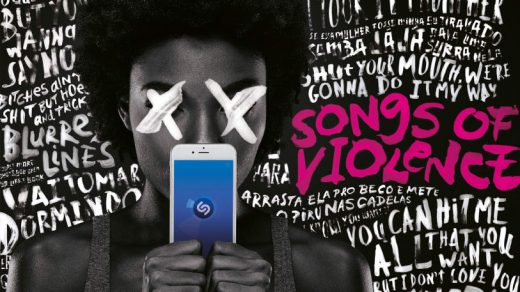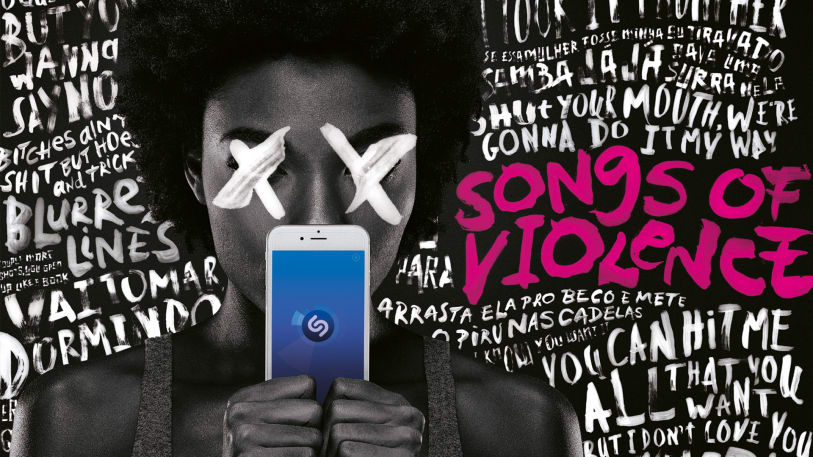Using Shazam To Counter Misogynistic Lyrics, And Other World Changing Ad Campaigns
Buried in the second verse of D12’s 2002 song “Fight Music” is the line: “I fucking hate you, I’ll take your drawers down and rape you.” In his 2012 song D2B, the rapper Problem takes a subtler but still pernicious approach, claiming: “In the bedroom there ain’t no rules.”
But there are, and they hinge around consent, communication, awareness, and comfort–concepts that many songs ignore in favor of promoting violence, abuse, and a toxic masculinity that too often bleeds into culture. In “Songs of Violence,” a campaign that ran for a month in April 2016 in Brazil, the newspaper Estadão teamed up the advertising agency FCB and the domestic violence hotline Disque Denúncia to draw attention to how often we hear these messages–and why unabsorbing or ignoring them should not be the response. Songs of Violence won the advertising award in the 2017 World Changing Idea awards (you can read more about all the finalists below).
Working with Shazam, FCB identified around 300 songs that contain the kind of violence against women described in Brazil’s anti-domestic violence statute Federal Law 11340, called the Lei Maria da Penha for the woman who became a leader of the country’s women’s rights movement after her ex-husband twice attempted to murder her. Once the songs were tagged according to lyrics and the section of the law they corresponded to, Disque Denúncia provided testimonials from real women who had experienced similar abuse. The women who shared their experiences all did so voluntarily, through a hotline set up by FCB and Disque Denúncia. “Just listening to the testimonials was nerve-wracking for us,” Fabio Simoes of FCB tells Fast Company. “We can only imagine what it was like for them–you could still feel the anguish and pain in their voices.”
During the month-long “Songs of Violence” campaign, when someone used Shazam to identify one of the 300 songs tagged by FCB, they would instead hear one such survivor testimonial. Each song was matched with its own testimonial; a banner would cover the phone screen with information about abuse and violence. The campaign reached over a million people, and just 6% chose to download the song after listening to the testimonial.
“Very often, the phrase ‘it’s a cultural thing’ is used as an excuse for bad behavior, especially when it comes to sexism in Brazil,” Simoes says. According to the World Health Organization, around one in three women will experience physical or sexual abuse. While it’s impossible to draw an evidence-based link between violence in music and in the world, our popular culture’s normalization of rape, abuse, and disregard for a woman’s boundaries and comfort has seeped into how we process and respond to such incidences. It’s not too much of a stretch to leap from how we nod along to lyrics like Problem’s and D12’s to how a confirmed rapist can walk away from a trial with a paltry six-month jail sentence.
“Songs of Violence,” Simoes says, sparked the beginning of an important debate for Brazil. “Violence against women is not entertainment–it’s a crime,” he says. While a month-long campaign can’t bring about a complete culture shift, it’s a start: This year, for the first time, organizers of street parties during Carnival–Brazil’s rowdiest holiday–mobilized to outlaw a handful of songs integral to traditional Carnival performances. Objecting to sexist and homophobic lyrics, one organizer, Debora Thome, told The Chicago Tribune that “Carnival in Brazil reflects a lot of what we see in our day-to-day life.” So does music; “Songs of Violence” is a reminder that change can start with what we listen to.
Here’s more about the finalists in the advertising category:
“Wander Wisely”
Campbell Ewald for Travelocity
In 2015, Pauline Lewis flew halfway across the globe to Ethiopia, where she spent her trip helping an organization for women and orphans build up a library and a computer lab. Voluntourism is a growing phenomenon: 63% of Americans would ideally combine vacation with giving back. What’s stopping a lot of them: cost. The videos Campbell Ewald created for Travelocity highlight the agency’s Travel For Good program, which offers grants to people from the U.S. to pursue social good projects around the world. Following Pauline and the other 2015 grand prize winner, the videos compel people to find a passion project and apply for a grant to see it through.
“Women Not Objects”
Badger & Winters
It takes just a drive on a highway or a flip through a magazine to see that the advertising industry makes big bucks exploiting women. When the message to stop doing so comes from within the advertising industry itself, people listen. As one of the few female-led advertising agencies, Badger & Winters launched #WomenNotObjects in January 2016 to call on advertisers to stop objectifying women in their work. The videos, which show what happened when the team at Badger & Winters Googled “objectification of women,” racked up over 45 million views and commitments from a range of competitors and media organizations to hold a mirror up to themselves and reconsider how they portray women for the sake of profit.
“Great Immigrants”
Atlantic Media Strategies and Carnegie Corporation
Especially under the watch of Donald Trump’s presidency, immigration has become a politicized, often dehumanized, topic. Through its Great Immigrants campaign, Carnegie sheds a light on the lives of immigrants and how they contribute to and shape American culture. In a series of videos created in partnership with Atlantic Media Strategies and reaching 3.4 million people, Carnegie tells the story of immigrants like Diane von Furstenburg and Jose Andres to inspire immigrants to apply for citizenship, and encourage Americans to empathize and engage with immigration on a personal level.
Future Fab
Ideo.org
In five regions across Kenya, Ideo.org partnered with the pro-contraceptive organization Marie Stopes International to educate teens, communities, and health care providers about contraception and safe sex. Deploying everything from posters and T-shirts to a fashion show and a magazine, Future Fab sent the message–in bright, bold lettering–that safe sex is the cool choice. Since the program launched in 2016, over 1,000 kids have participated in the programming and learned how a proactive approach to sexual health can set them up for a successful future.
The Fair Food Program
Pinkwater & Putman for the Coalition of Immokalee Workers
In 2011, the Coalition of Immokalee Workers, a human-rights organization based in Florida, launched the Fair Food Program (FFP) to ensure that all workers on participating farms received fair wages under humane working conditions. The FFP involved farmworkers, Florida tomato growers, and thirteen retail buyers, including Whole Foods, WalMart, and Chipotle. By partnering with Pinkwater & Putnam, the FFP ensured that their work would be recognized and shared by developing a label and branding campaign that would let consumers know when they were buying a Fair Food product, and spread FFPs message through media and talk show placements.
Detroit Matters
Havas Chicago for Craftsman
Across American cities, divestment has left behind abandoned parks and community centers in need of repairs, but lacking the funding to see them through. Last year, the construction tool company Craftsman partnered with a local gardening group, the Detroit Mower Gang, to revitalize 31 parks during a 12-hour marathon event. Havas Chicago caught it all on film and turned it into a documentary that is the first in a planned Craftsman Fixes America series. The film reached over 1 million people and drew countless suggestions for the next place Craftsman can help fix, and brought 60 volunteers to the Detroit Mower Group.
“Green Laces”
Anomaly for Dick’s Sporting Goods
In 2014, the Fifth Ward Saints, a football team in an impoverished part of Houston, had their equipment stolen and lacked the resources to replace it. Dicks Sporting Goods stepped in to replace the equipment and donate extra funding, and through its Green Laces campaign, developed with Anomaly, the company is continuing to raise money for underfunded youth sports by donating $ 2 of every purchase made during the holiday season to a program in need.
“Love Has No Labels”
R/GA
Behind an x-ray screen installed on Valentine’s Day 2015 in Santa Monica, two skeletons dance toward each other, then embrace. A crowd gathered around cheers, and cheers louder when the skeletons emerge from behind the screen to reveal themselves as two women. “Love Has No Labels” asks everyone to look their biases in the face by challenging our assumptions and recognizing that everyone–regardless of race, sexuality, age, and disability–is capable and deserving of love. The video of the Santa Monica installation reached over 160 million views and became the second-most viewed and shared PSA in history.
“Unfairy Tales”
180LA for Unicef
With over 10 million people displaced and in need of aid, the Syrian refugee crisis should be inspiring an outpouring of humanitarian assistance. But refugees often run into crossed arms and closed borders. A series of videos created by 180LA for Unicef, “Unfairy Tales” animate the experience of fleeing Syria as a child. Despite the format, the videos are dark and thought-provoking, and tell the stories of real-life Syrian refugees; the creators hope they will inspire empathy and an offer a new lens on an often-misunderstood crisis.
“Inject Hope”
Landor for Hamilton County Heroin Coalition
The opioid crisis in the U.S. is often discussed in terms of statistics: 33,000 people killed in 2015; life expectancy declining in rural areas. When the Hamilton County Heroin Coalition in Ohio approached the agency Landor to develop an awareness strategy, they expected something straightforward, but Landor’s “Inject Hope” campaign brought the crisis home in an unexpected way. Instead of depicting addiction as something that happens far away (despite the fact that nearly half the area residents know someone affected by heroin use), Landor humanized the epidemic by portraying ordinary people–friends, relatives, coworkers–who were also addicts in need of help. Since the campaign launched last year, six more counties have gotten involved in spreading awareness.
“Walk With Yeshi”
AKQA
On Facebook Messenger “Walk With Yeshi” allows users to follow a young Ethiopian girl as she takes a 2.5-hour-long journey to collect drinking water. Through the app, Yeshi shares her life as users hear the sounds of her footsteps, the music from her village, and hear descriptions of what she sees along her path. They also hear the difficulties of the long journey under the sun. The campaign by AKQA is an exercise in radical empathy, and through it, Lokai and Charity: Water were able to build 33 wells in Ethiopia.
Wheels4Water
Rule29 Creative
Two creative and bike enthusiasts founded Wheels4Water with the idea that they could transform their passion for cycling into a way to help fight the worldwide water crisis. Each year, Wheels4Water works with their development partner, Lifewater International, to determine a community anywhere in the world in need of safe water and sanitation resources. They then plan an epic cycling trip to raise money and awareness: In 2014, Wheels4Water led a group from Boston to Chicago; in 2015, they rode the California coast. So far, they’ve raised over $ 235,000 and helped around 6,000 people gain access to safe water.
Suspended for What?
DoSomething.org
Students who are suspended are three times more likely to drop out of school, which triples the likelihood they’ll end up behind bars. And often, they’re suspended for reasons that are better addressed through counseling and a restorative justice approach. Through its Suspended for What? campaign, DoSomething.org engaged a range of partners, including the NAACP and ACLU, to advocate for disciplinary reform in high schools around the country. Students shared their experiences with suspension and raised their voices to encourage their schools to adopt fairer policies. The pilot campaign resulted in at least five schools reforming their disciplinary protocol, and this year, DoSomething.org hopes to scale up and reach all 508 school districts where at least 25% of the school body has been suspended at least once.
(87)



